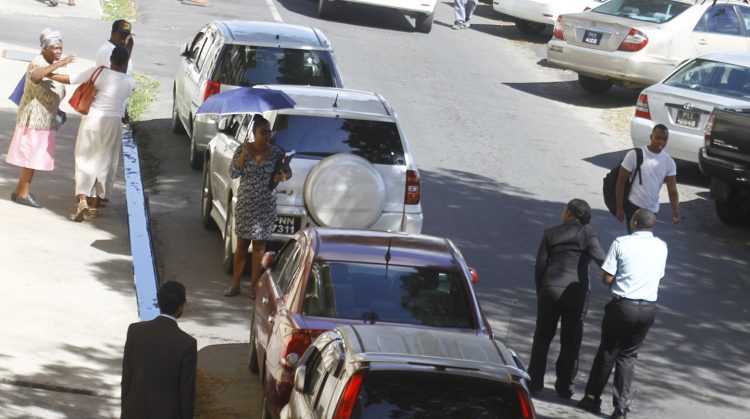Moments after being handed three life sentences for the three persons killed in a fire, which he set to their Sophia home back in 2015, Gavin Graham wreaked havoc in the courtroom of Justice Sandil Kissoon, causing injury to the prosecutor, whom his mother also assaulted.
The jury had only shortly before returned its verdict, which the foreman announced to be unanimously guilty on each of the three murder counts levelled against the father of two, who up to that point appeared expressionless.
Asked by the judge’s registrar the customary question of whether he had anything to say as to why the court should not proceed to sentence him in accordance with law, Graham began shouting and behaving in a disorderly manner.

Professing his innocence, Graham spoke about witnesses in the matter and the way they testified. He was, however, cautioned by the judge that his opportunity to address the court at that point needed to be about the sentence to be imposed.
Graham’s attorney Ravindra Mohabir then intervened and offered a plea in mitigation on his client’s behalf, asking, among other things, for the court to consider his client’s unblemished record behind bars and the fact that he had no prior antecedents.
After Justice Kissoon imposed the life sentences – which he ordered to run concurrently, and for which he said the convict is not to become eligible for parole until after serving 30 years on each count – pandemonium broke loose when Graham began pelting objects around the courtroom.
Allowed into the prisoners’ dock with a plastic bottle containing a liquid substance, which he had covered with a rag, Graham hurled the bottle at Prosecutor Tiffini Lyken, who went running through the door, hitting her side in the process.
Lyken ran into this reporter who, by that time, had already exited the courtroom.
From a safe distance, this newspaper saw members of the jury and others in the courtroom scampering for cover as Graham attempted to upturn the bench in the dock as police officers tried desperately to restrain him.
Graham, whose hands were not yet fully back in handcuffs, before being escorted from the courtroom, ripped away the microphone attached to the prisoners’ dock, which is connected to the recording system. He angrily pelted the microphone as he cursed and wrestled with the police officers, even as he seemingly tried to throw himself out of the dock.
The entire ordeal was witnessed by Justice Kissoon, who, after sentencing Graham and giving the officers permission to remove the prisoner, had not yet left the courtroom. He was just about to do so when the commotion started.
While prisoners are taken into the courtroom from the holding cell fully handcuffed and/or shackled, these restraints are removed before they appear before the judge.
It was while being handcuffed for transportation back to the court’s holding cell that Graham began his ruckus.
Senior State Prosecutor Tuanna Hardy, who was part of the prosecution team, told this newspaper that she was injured by the bottle thrown by the convict, which she said hit her leg after which it opened, causing its contents to spill.
From the scent, it seemed the bottle contained urine, which not only soiled the furniture in the courtroom, but spilt on persons and the piles of documents belonging to the prosecution.
The senior state counsel raised the issue of protection for members of the bar executing their jobs in the courtroom.
Assaulted
Lyken, who had run from the courtroom and on to the streets outside the courthouse, was later assaulted by Graham’s mother, who sprinkled the remaining substance in the bottle on her as the woman walked calmly down the street in the company of two other relatives.
This angered the scores of persons who, by that time had gathered, asking why the woman was not arrested by the ranks who man the court’s police outpost.
When this newspaper left the courthouse some 30 minutes after, the woman was standing at the corners of South Road and King Street talking with her relatives. It was later confirmed that she was arrested.
Even after being taken to the holding cell, Graham could be heard from the street loudly cursing and hitting the metal bars.
Nizoge Abrams, Clifford Sampson and Shawn Whyte were all killed following a fire set by Graham to their Lot 6036 ‘C’ Field, Sophia house on the night of January 2, 2015.
Addressing the court in a victim impact statement, Abrams’ sister, Candacey Buelow, told the court that what Graham had done to her sister and other family members has caused life to be very uncomfortable for them.
She said that for very long they have sought justice and closure, and the verdicts have in some sense provided that, but she noted sadly that it would not bring back her sister and other loved ones.
She said her sister’s children have been left without a mother and it’s often very difficult to answer their many questions of where she is. She said that the trial had been difficult also, as the family had to relive the events of that fateful day.
Noting that even more family members could possibly have died, Buelow said that violence is not the way.
Prior to the sentence being imposed, Lyken had asked the judge to consider the lives lost in what she said should have been the sanctity of their home and in which children could also have died in the horrible tragedy.
“Can you imagine the horror of throwing your grandchildren out the window and waking from your bed to find your house engulfed and cannot escape?” Lyken asked.
She reminded that from the evidence presented, Graham’s actions were premeditated.
The prosecutor also asked the court to consider that Graham expressed no remorse for his actions after the jury’s verdict, and called for a strong message of deterrence to be sent to potential offenders, that domestic violence will not be condoned.
Before passing sentence, Justice Kissoon told Graham that three innocent persons had lost their lives in the simple act of arson, which he described as a “brutal, heinous tragedy,” set in motion by him, Graham.
Noting the destruction to the house, and injury to others, the judge explained that the sentence needed to reflect the nature and gravity of the offence.
Recalling the fiery death her sister and the others faced, Buelow, during the trial, had testified that owing to conversations she had with Abrams, she had reason to repeatedly “warn” her about Graham, with whom she (Abrams) shared a relationship.
It was the state’s case that Graham set the fire after Abrams ended the relationship.
The court heard that he had previously said that he would burn the house down.
Graham had also suffered burns.









